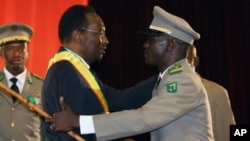Mali’s military junta has agreed with the Economic Community of West African States to allow interim president Dioncounda Traore to lead the country’s post-coup transitional process.
The agreement, just two days before the 40-day transition period prescribed by Mali's constitution was set to expire, also gives coup leader Captain Amadou Sanogo all the benefits and privileges of a former head of state.
Hamadoune Toure, Mali’s communication minister and government spokesman, says he believes Sunday’s agreement is a positive step towards returning Mali to constitutional rule after the March 22 ouster of the country’s civilian leaders.
“It’s a good move, it’s a positive move, so that the transition can now start and do its job,” he said.
The spokesman says the status conferred on Captain Sanogo does not mean the coup leader will remain in power. “It’s not recognizing him to have a say (in the transition process), but they [ECOWAS] said he will have advantages recognized to all former heads of state,” Toure said. “They invited him to work as a team with the president and with the prime minister, for the supreme interests of Mali. And all actors are called on not to disrupt the transition process.”
Under the newly signed agreement, the interim president will have a year to lead the country to elections. But Toure said there is not yet a specific timetable for when the polls will be held.
“We have to work on a road map,” he said, adding that Mali’s leaders must also work on tackling the situation in the north of the country. “We will have to work on a timetable to see how to take up the two challenges we are facing now,” he said.
Soldiers, angry over the government's handling of security challenges in the north, ousted Mali's civilian leaders on March 22, just a month before a presidential election was scheduled. Armed groups in Mali’s northern region seized the opportunity and quickly pushed south, effectively cutting the country in half.
Tuareg separatist group, the MNLA, declared the independent state of Azawad on April 5, while Islamist group Ansar Dine rejected independence and instead began imposing its version of Sharia law in northern towns.
ECOWAS and other international bodies say the security crisis threatens to destabilize the entire region. Tens of thousands of Malians have fled the violence and food insecurity in the north.
The agreement, just two days before the 40-day transition period prescribed by Mali's constitution was set to expire, also gives coup leader Captain Amadou Sanogo all the benefits and privileges of a former head of state.
Hamadoune Toure, Mali’s communication minister and government spokesman, says he believes Sunday’s agreement is a positive step towards returning Mali to constitutional rule after the March 22 ouster of the country’s civilian leaders.
“It’s a good move, it’s a positive move, so that the transition can now start and do its job,” he said.
The spokesman says the status conferred on Captain Sanogo does not mean the coup leader will remain in power. “It’s not recognizing him to have a say (in the transition process), but they [ECOWAS] said he will have advantages recognized to all former heads of state,” Toure said. “They invited him to work as a team with the president and with the prime minister, for the supreme interests of Mali. And all actors are called on not to disrupt the transition process.”
Under the newly signed agreement, the interim president will have a year to lead the country to elections. But Toure said there is not yet a specific timetable for when the polls will be held.
“We have to work on a road map,” he said, adding that Mali’s leaders must also work on tackling the situation in the north of the country. “We will have to work on a timetable to see how to take up the two challenges we are facing now,” he said.
Soldiers, angry over the government's handling of security challenges in the north, ousted Mali's civilian leaders on March 22, just a month before a presidential election was scheduled. Armed groups in Mali’s northern region seized the opportunity and quickly pushed south, effectively cutting the country in half.
Tuareg separatist group, the MNLA, declared the independent state of Azawad on April 5, while Islamist group Ansar Dine rejected independence and instead began imposing its version of Sharia law in northern towns.
ECOWAS and other international bodies say the security crisis threatens to destabilize the entire region. Tens of thousands of Malians have fled the violence and food insecurity in the north.










